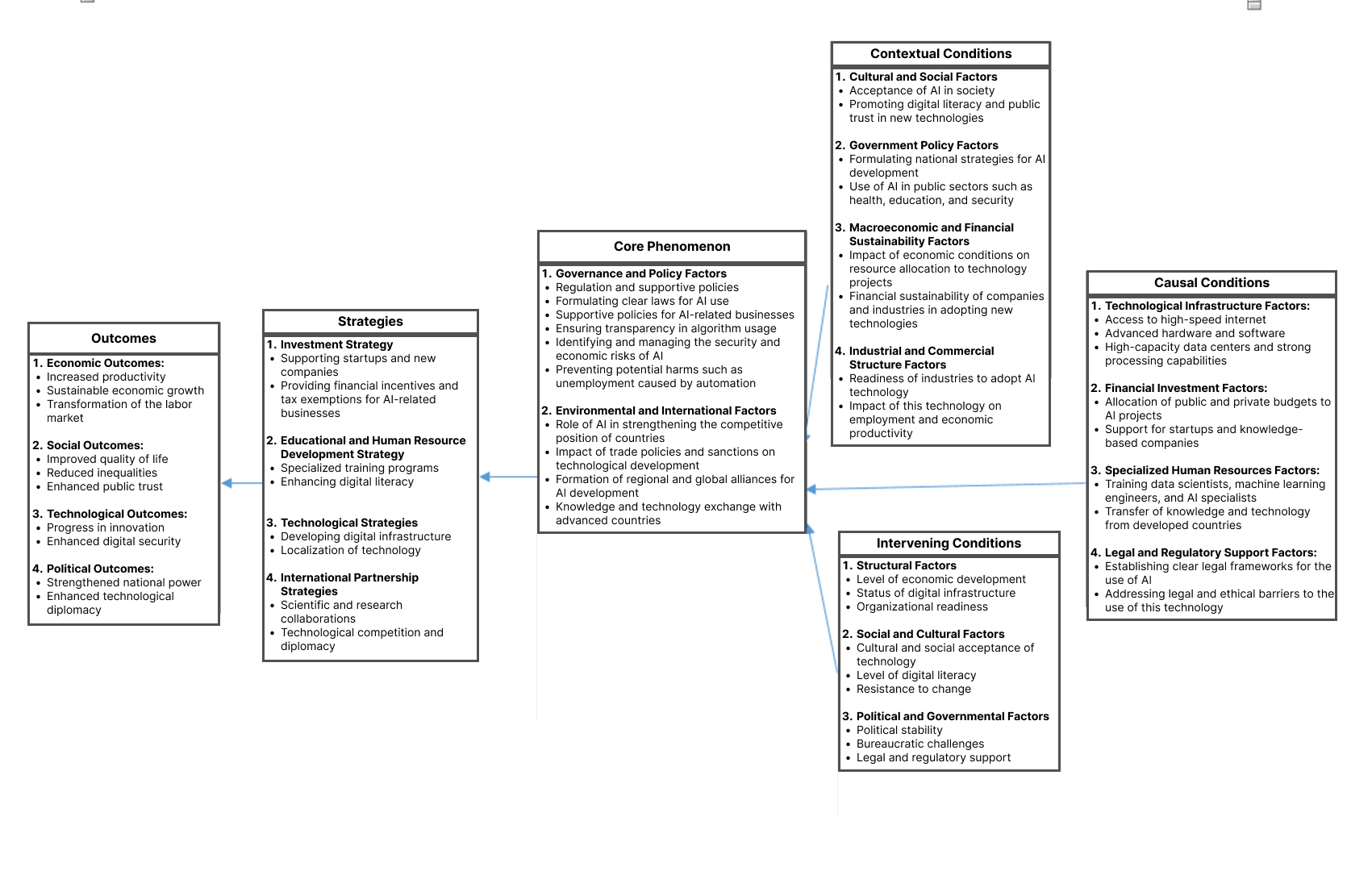Activation of Artificial Intelligence Technology Capacities in Expanding Economic Strategies and National Macroeconomic Policies with a Piloting Approach
Keywords:
Artificial Intelligence Technology, Economic Strategies, Macroeconomic Policies, Piloting ApproachAbstract
The present study aimed to activate the technological capacities of artificial intelligence in expanding economic strategies and national macroeconomic policies. This research, conducted with a piloting approach to improve the research process through identifying weaknesses, refining tools and methods, and preventing issues that may arise on a larger scale, is applied in terms of its purpose and qualitative in nature, using a data-driven and exploratory approach. It was carried out in two phases. In the first phase, the participants were experts from the industrial and academic sectors (managers of knowledge-based companies in the field of information technology and university professors with a Ph.D. in economics and technology). These participants were selected using purposive sampling based on the principle of theoretical saturation, and 18 individuals were chosen as the sample. The data collection tool was semi-structured and in-depth interviews with participants. Initially, the data obtained from the interviews were implemented based on the systematic approach of Strauss and Corbin, and analyzed in three stages: open coding, axial coding, and selective coding. The validity and analyses conducted were confirmed by the interviewees. In the second phase, the results of the analysis (from phase one) were formulated into a questionnaire and distributed in three rounds using the Delphi method among 42 managers (from startups, organizations, and governmental institutions). In the first round of Delphi, the questionnaire was distributed among 15 experts, and after calculating the Kendall's concordance coefficient of 0.564, 25 components were eliminated. In the second and third rounds of Delphi, the questionnaire was distributed among 15 and 12 individuals, respectively. Since the significance level for all components was less than 5%, no components were eliminated in the second and third rounds, and the Kendall's concordance coefficient was calculated as 0.600 and 0.788, respectively, indicating strong consensus among the members. Finally, the research model was developed with 6 main categories and 55 subcategories.
References
Z. Aksentijević Karaman, N. Ježić, and P. Zaninović, "The Effects of Information and Communication Technology (ICT) Use on Human Development, A Macroeconomic Approach," MDPI: Economies, 2021.
Y. Qin, Z. Xu, X. Wang, and M. Skare, "Artificial Intelligence and Economic Development: An Evolutionary Investigation and Systematic Review," Journal of the Knowledge Economy, 2023, doi: 10.1007/s13132-023-01183-2.
Z. Sharifzadeh, A. H. Mirkoushesh, and M. M. Hosseini, "The effects of development policies for new technologies and artificial intelligence on expanding macro-political strategies with an approach to general policies of the system," Quarterly of Strategic Macro Policies, vol. 12, 2024.
M. Khezri, M. K. Naziri, and S. Gharloghi, "Experimental Study of the effects of ICT Developmental Policies on Iran's Economic Growth," Quarterly Journal of The Macro and Strategic Policies, vol. 8, no. 32, pp. 692-715, 2020.
N. Haefner, J. Wincent, V. Parida, and O. Gassmann, "Artificial intelligence and innovation management: A review, framework, and research agenda," Technological Forecasting and Social Change, vol. 162, 2021, doi: 10.1016/j.techfore.2020.120392.
O. Vyshnevskyi, V. Liashenko, and O. Amosha, "The impact of Industry 4.0 and AI on economic growth," Scientific Papers of Silesian University of Technology Organization and Management Series, vol. 9, pp. 391-400, 2019, doi: 10.29119/1641-3466.2019.140.32.
A. Dafoe, "AI Governance: A Research Agenda," Center for the Governance of AI Future of Humanity Institute, University of Oxford, 2018.
S. A. Roshan, N. Yaghoubi, and A. R. Momeni, "The application of artificial intelligence in the government sector: A meta-synthesis study," Quarterly of Management Sciences, vol. 16, no. 61, pp. 117-146, 2021, doi: 10.1007/978-3-030-64254-9_4.
S. Tolan, A. Pesole, F. Martínez-Plumed, E. Fernández-Macías, J. Hernández-Orallo, and E. Gómez, "Measuring the occupational impact of AI: tasks, cognitive abilities and AI benchmarks," Journal of Artificial Intelligence Research, vol. 71, pp. 191-236, 2023, doi: 10.1613/jair.1.12647.
T. Miller, "Explanation in artificial intelligence: Insights from the social sciences," Artificial Intelligence, vol. 267, pp. 1-38, 2019, doi: 10.1016/j.artint.2018.07.007.
C. Cath, "Governing artificial intelligence: ethical, legal and technical opportunities and challenges," Philosophical Transactions of the Royal Society A: Mathematical, Physical and Engineering Sciences, vol. 376, no. 2133, 2018, doi: 10.1098/rsta.2018.0080.
S. M. A. Mousavi, A. Aliabadi, and M. Rezaei Sadrabadi, "Analyzing various applications of artificial intelligence in economic analysis and macro-policy," 2021.
S. H. Vaghfi and R. Darabi, "Validation of artificial intelligence algorithms in predicting financial distress in the industry and mining sectors, emphasizing the role of macroeconomic, financial, managerial, and risk variables," Business Research Letter, vol. 91, pp. 213-243, 2019.
T. Atashbar and R. Shi, "AI and Macroeconomic Modeling: Deep Reinforcement Learning in an RBC model," International Monetary Fund, 2023, doi: 10.5089/9798400235252.001.
S. Novikov, A. Sazonov, and C. C. Ortíz Paez, "Artificial intelligence as a focus of digital economy development: Theoretical and practical aspects," Economics Journal, vol. 14, no. 19, 2022.
J. Reis, P. Santo, and N. Melão, "Impact of Artificial Intelligence Research on Politics of the European Union Member States: The Case Study of Portugal," Sustainability, vol. 12, no. 17, 2020, doi: 10.3390/su12176708.
V. Ghorbani and A. Faghihi, "The Alignment of Knowledge Management Strategies with Human Resource Management According to Science and Technology General Policies," Quarterly Journal of The Macro and Strategic Policies, vol. 9, no. 34, pp. 328-359, 2021.












